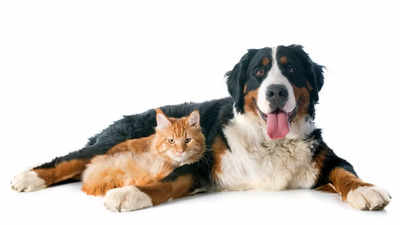- News
- lifestyle
- relationships
- pets
- How to take care of senior pet dogs and cats
Trending
How to take care of senior pet dogs and cats
Not all dogs age at the same pace. Larger dogs reach seniority before smaller dogs and cats due to shorter lifespans. Tips for senior pets include a meat-based diet, anti-inflammatory foods, bone broth, antioxidants, probiotics, exercise, mental stimulation, and proactive vet visits.

How to take care of senior pet dogs and cats
Did you know that not all dogs age at the same pace? Larger dogs because they have shorter lifespans attain seniority before smaller dogs and cats for example.
Our furry companions have short lifespans, and let’s face it, no amount of time spent with them is enough.
Below are a few mindful steps for senior years and how to help our pets live them out better:
Diet – A good quality meat-based diet is advisable.It is a fallacy that senior animals need a low-protein diet. They need the meat protein to help keep their muscles healthy, and their heart healthy and prevent them from putting on weight from eating starchy/carby foods instead.
1. Anti-inflammatory foods: adding small fish rich in omega 3 fatty acids to their diet and good quality fish oil. Also add turmeric via golden paste (a paste made with coconut oil, turmeric, water and pepper) which has anti-inflammatory and anti-cancer benefits.
2. Including bone broth in their diet to keep them hydrated. It also keeps their gut healthy and supports their joints.
3. Adding anti-oxidant foods to their diets to slow down the ageing process and protect against free radical damage – these include fruits like pomegranates and blueberries – and also natural sources of vitamin E like wheat germ oil, sunflower seeds and safflower oil.
4. Probiotic foods for immune support like yoghurt, kefir and fermented vegetables, as well as a nice blend of vegetables in their diet for phytonutrients and a good source of fibre
5. As pets age, their joints also get achy. Gentle exercise is key to keep them active, yet not over-exert. Because they walk less, their nails don’t get filed as before. Do check that their nails are not overgrown as this can be painful when walking.
6. Stimulating them mentally also helps release endorphins and keeps them happy. This involves activities like giving your dog a bone to chew, a sniffer mat to sniff treats out from and other puzzle games.
7. Senior proof your home, make sure the surfaces are not slippery, and that you have ramps perhaps to climb into the car, couch or bed to make things easier on their joints and avoid injuries.
8. Be proactive about their health– vet visits every year (or 6 months) for a general check-up and blood work to catch any issues that may arise early. Before vaccinating your senior pet ensure they are completely healthy, your vet will be able to guide you for this.
Authored by: Anjali Kalachand, pet nutritionist
Our furry companions have short lifespans, and let’s face it, no amount of time spent with them is enough.
Below are a few mindful steps for senior years and how to help our pets live them out better:
Diet – A good quality meat-based diet is advisable.It is a fallacy that senior animals need a low-protein diet. They need the meat protein to help keep their muscles healthy, and their heart healthy and prevent them from putting on weight from eating starchy/carby foods instead.
Some additions recommended for a senior pet’s diet are:
1. Anti-inflammatory foods: adding small fish rich in omega 3 fatty acids to their diet and good quality fish oil. Also add turmeric via golden paste (a paste made with coconut oil, turmeric, water and pepper) which has anti-inflammatory and anti-cancer benefits.
2. Including bone broth in their diet to keep them hydrated. It also keeps their gut healthy and supports their joints.
3. Adding anti-oxidant foods to their diets to slow down the ageing process and protect against free radical damage – these include fruits like pomegranates and blueberries – and also natural sources of vitamin E like wheat germ oil, sunflower seeds and safflower oil.
4. Probiotic foods for immune support like yoghurt, kefir and fermented vegetables, as well as a nice blend of vegetables in their diet for phytonutrients and a good source of fibre
5. As pets age, their joints also get achy. Gentle exercise is key to keep them active, yet not over-exert. Because they walk less, their nails don’t get filed as before. Do check that their nails are not overgrown as this can be painful when walking.
6. Stimulating them mentally also helps release endorphins and keeps them happy. This involves activities like giving your dog a bone to chew, a sniffer mat to sniff treats out from and other puzzle games.
7. Senior proof your home, make sure the surfaces are not slippery, and that you have ramps perhaps to climb into the car, couch or bed to make things easier on their joints and avoid injuries.
8. Be proactive about their health– vet visits every year (or 6 months) for a general check-up and blood work to catch any issues that may arise early. Before vaccinating your senior pet ensure they are completely healthy, your vet will be able to guide you for this.
Authored by: Anjali Kalachand, pet nutritionist
Rupali Ganguly shares a heartfelt message on Pet Day
End of Article
FOLLOW US ON SOCIAL MEDIA










